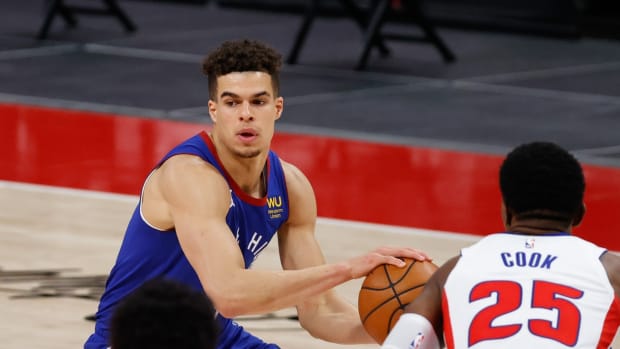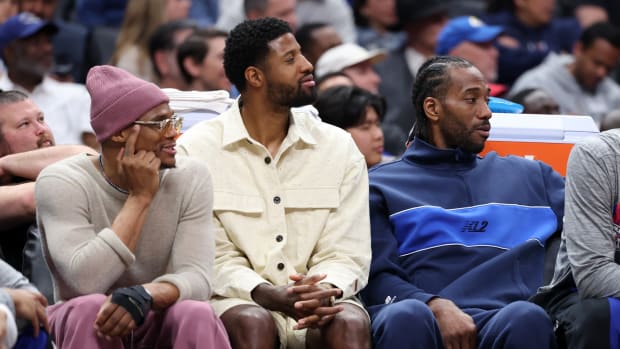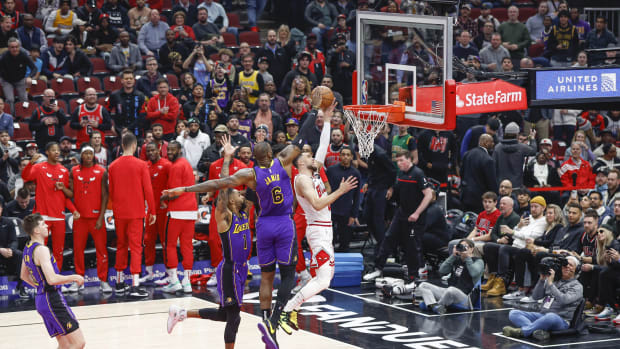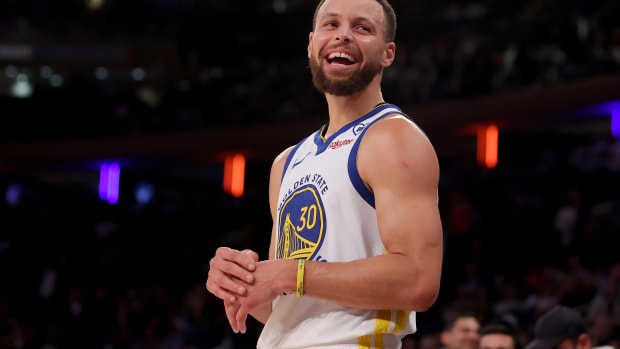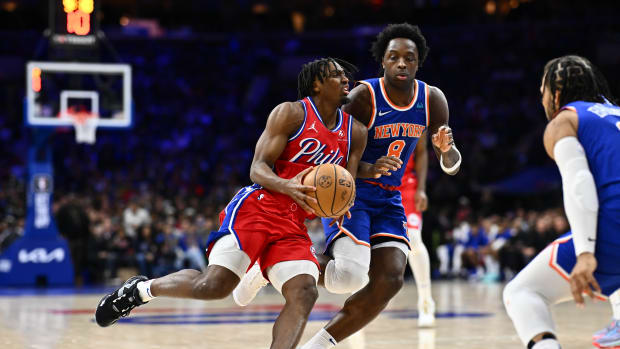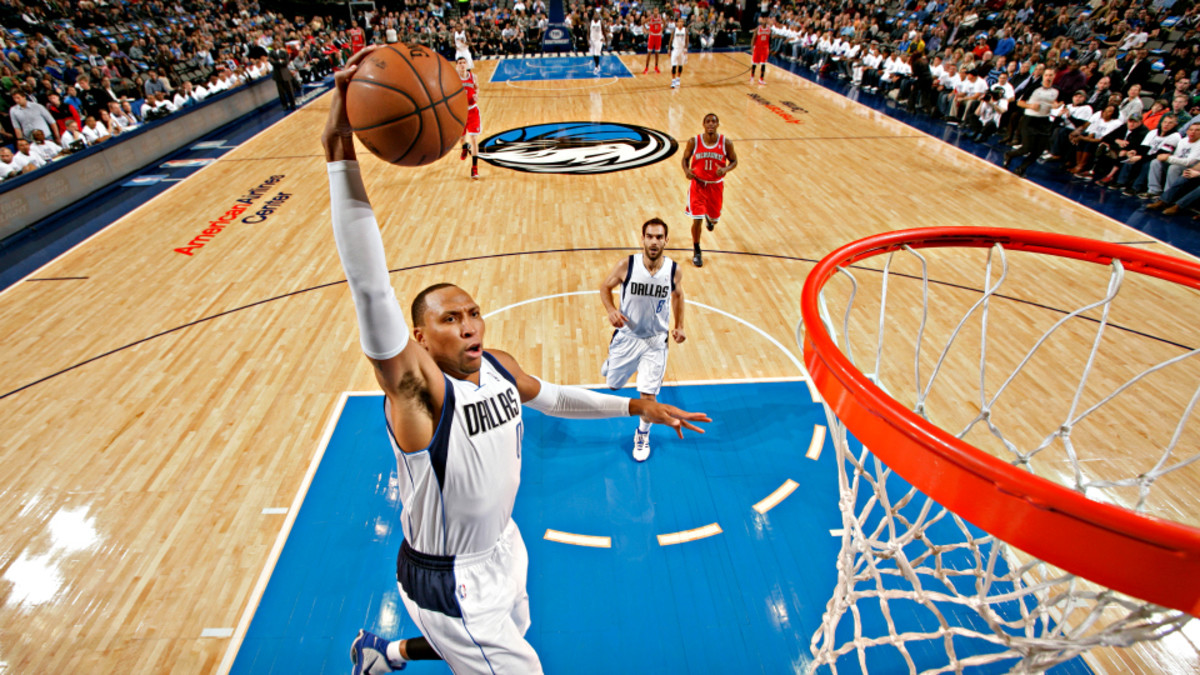
Shawn Marion's fate a fascinating subplot in Mavs' offseason plans
The Mavericks have pitched to free-agentsuperstars and made provisions to re-sign their own. As is the case for other suitors, there is only so much that can be done until LeBron James and Carmelo Anthony determine their futures. Dallas will preserve flexibility in the event that either player looks its way. All the while, though, teams out of the superstar hunt will continue to work the margins of free agency.
As a result, the Mavericks could be forced to make some tricky decisions ahead of their preferred schedule. In a perfect world, Dallas could move from one target to the next, falling back on its incumbent free agents if nothing else came through. In reality, however, rivals with less intricate offseason plans will be pursuing the Mavs' own free agents throughout that process. This is where starting small forward Shawn Marion becomes a player of interest for the Mavs, both for the safety he represents and the difficulty of working around his cap hold.
SI.com's 2014 NBA free agent tracker
Marion, 36, a Maverick for the past five seasons, is the image of security in Dallas. There's a comfort level between both player and organization that could easily continue, if only in the case that the Mavs fail in their pursuit of James, Anthony, Chandler Parsons, Luol Deng and Trevor Ariza, among others. At the same time, Marion is coveted around the league as a versatile defender who could help push a championship contender over the top -- a market that overlaps only slightly with those teams in play for James and Anthony. As such, there could be a more active and immediate market for Marion than Dallas would prefer, given the franchise's intent to run out the string not only with its first choice in free agency but also its second and third options.
The Mavs' approach makes understandable basketball sense. Marion is a lesser player and asset than Parsons and Deng, either of whom would position Dallas to threaten the Western Conference hierarchy. In not prioritizing Marion, however, the Mavs risk going through the free-agent process with a handful of preferred candidates and ending up with no star small forward and no real insurance. Marion has a weird standing with the team -- somewhere between want and need, depending on how free agency unfolds.
The salary-cap specifics of Marion's free agency don't help the odds of his re-signing much, either. Marion has a $14 million hold that counts against the cap, lasting until he signs a new deal or Dallas renounces his rights. Any big-ticket free-agent move would likely require the latter. Marion will be a tough sell to return at a bargain salary, and the Mavs' cap situation is such that it may not be possible to bring in a quality free agent and re-sign Marion at a competitive rate, much less accomplish both while still satisfying other needs.
To complicate matters further, the implications of losing Marion go well beyond the small forward position. He has also been the primary backup to power forward Dirk Nowitzki, and Marion's departure would leave the Mavs without an in-house alternative. Dallas might be reluctant to surrender its cap holds on (and exception rights to) free-agent big men DeJuan Blair and Bernard James for just this reason. The Mavs could trim their salary total a hair (and only a hair; there are no substantial savings to be found here) by renouncing the rights to both players. There could be more to gain, though, by holding those rights for use as potential roster filler. Blair and James could be re-signed at slight raises even after Dallas' other commitments put them over the salary cap, all without influencing potential offers to James or Anthony much.
Ranking the NBA's top 25 free agents
Otherwise, Dallas will be subject to the market in its bid for a quality backup big man, a clear need tabled until the second wave of free agency at the earliest. By then the Mavs might be looking at the likes of Jason Smith or Anthony Tolliver at reserve power forward. Emeka Okafor, Jermaine O'Neal or Chris Andersen could also be in play as a potential backup center, shifting Brandan Wright to back up Nowitzki. These are serviceable options, provided they're available in the Mavs' price range. In a marketplace where Chris Kaman pulls a $4.8 million salary, however, there can be no guarantee.
Dallas could face a similar dilemma with swingman Vince Carter and guard Devin Harris, both of whom could be courted before the Mavs are in a position to commit. This is where every inch of flexibility helps and the order of operations becomes crucial. Dallas reportedly has its finger on the trigger of a deal that could pay James or Anthony more than $18 million in the first year, but it can't reach that figure without some creative financing. That Nowitzki's new contract agreement remains unsigned offers some wiggle room, as does the trade appeal of Wright and the mechanics of manipulating the team's minimum-salary contracts and cap holds. If Harris can be persuaded to re-sign, the Mavs can leave his tiny cap hold ($915,243) on the books and complete a pricier deal later in free agency. If Dallas can sell Carter on a return, room can be cleared by re-signing him to any deal under his current cap hit ($6 million).
This is a smart organization that will extract every dollar allowed to build its roster. Yet with Dallas facing such specific needs in a challenging market, will ingenuity be enough to secure a rise to championship contention?






























